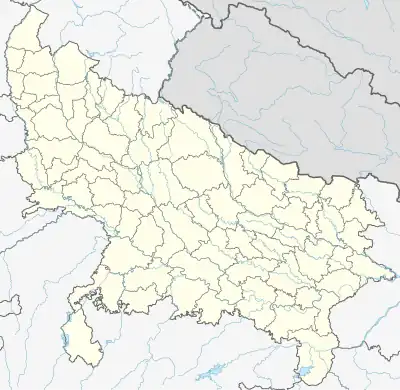| Vrindavan Chandrodaya Mandir | |
|---|---|
| Religion | |
| Affiliation | Hinduism |
| District | Mathura |
| Deity | Radha Krishna |
| Location | |
| Location | Vrindavan |
| State | Uttar Pradesh |
| Country | India |
 Location in Uttar Pradesh | |
| Geographic coordinates | 27°34′04″N 77°38′42″E / 27.567776°N 77.644932°E |
| Architecture | |
| Type | Nagara architecture and Modern architecture |
| Creator | ISKCON (International Society for Krishna Consciousness) |
| Completed | December 2026 |
| Elevation | 213 m (699 ft) |
| Website | |
| vcm | |
Vrindavan Chandrodaya Mandir is a temple under early stages of construction at Vrindavan, Mathura, India. As planned, it will be the tallest religious monument in the world.[1][2] At its potential cost of ₹700 crore (US$88 million) it is likely to be one of the most expensive temples in world. The temple has been planned by ISKCON Bangalore.[3] The planned effort includes the temple rising to a height of about 700 feet (210 meters) or 70 floors) and a built-up area of 540,000 sq. ft. (~50,000 sq. m.).[4] The project is set in 62 acres of land and includes 12 acres for parking and a helipad.[5]
History

In 1972, Srila Prabhupada, the founder and Acharya of ISKCON spoke about the principle of Yukta Vairāgya right in front of the Bhajan Kutir (a simple and austere dwelling of an ascetic primarily intended to perform his spiritual activities like chanting Krishna's names, writing and teaching) of Sri Rupa Goswami (see picture) to his dozen or more western disciples who were accompanying him on a visit to Vrindavan, India. He said:
Just like we have got a tendency to construct a skyscraper building. As in your country, you do. So you should not attached to the skyscraper building, but you can utilize the tendency by constructing a big temple like skyscraper for Krishna. In this way, you have to purify your material activities.
— Srila Prabhupada's lecture in Vrindavan, 29 October 1972[6]
Inspired by this vision and statement of Srila Prabhupada, the devotees of ISKCON Bangalore, who are strictly adhering to prabhupadas instructions conceived the Vrindavan Chandrodaya Mandir project to build a skyscraper temple for Lord Sri Krishna.
The foundation stone laying ceremony of Chandrodaya temple in Mathura district was done on 16 March 2014, on the eve of the auspicious occasion of Holi.[7]
Gallery
 South Block View From Backside
South Block View From Backside Top View of Upcoming South Block
Top View of Upcoming South Block The South Block's top view from the east side
The South Block's top view from the east side South Block View From West Side
South Block View From West Side.png.webp) South Block
South Block South Block top view
South Block top view South Block backside view
South Block backside view
Construction
Madhu Pandit Dasa had a meeting with President Pranab Mukherjee where he briefed him about the idea of creating the temple.[8] In March 2014, the Uttar Pradesh Chief minister Akhilesh Yadav inaugurated the project.[9] and on 16 November 2014, the President of India, Pranab Mukherjee laid the foundation stone of the temple.[10] The temple building is under construction. The original architectural design has been changed twice (2019[11] and 2022[12]).
See also
- Temple of the Vedic Planetarium, Mayapur
- Viraat Ramayan Mandir
References
- ↑ "The world's tallest religious building is under construction". bdcnetwork.com. 7 December 2016. Retrieved 7 December 2016.
- ↑ "Indian temple will be the world's tallest religious skyscraper". cnn.com. 22 November 2016. Retrieved 22 November 2016.
- ↑ Akhilesh Yadav inaugurates project to build Vrindavan Chandrodaya Mandir, the tallest temple in India - Economic Times
- ↑ Vrindavan Spiritual Capital of India,Vrindavan Chandrodaya Mandir
- ↑ ISKCON to build world's tallest temple at Mathura from today
- ↑ Vrindavan Chandrodaya Mandir
- ↑ 70-storey skyscraper temple for Lord Krishna in Vrindavan | Business Line
- ↑ "Madhu Pandit Dasa briefs President on Lord Krishna's tallest temple". 6 July 2015.
- ↑ "Akhilesh Yadav inaugurates project to build Vrindavan Chandrodaya Mandir, the tallest temple in India". Retrieved 7 May 2020.
- ↑ PTI (15 November 2014). "President Pranab Mukherjee to lay foundation stone of tallest Krishna temple in Vrindavan". DNA. Retrieved 26 April 2018.
- ↑ "Explains the Vision of Vrindavan Chandrodaya Mandir | Update 2020 - YouTube". YouTube.
- ↑ "Vrindavan Chandrodaya Mandir".